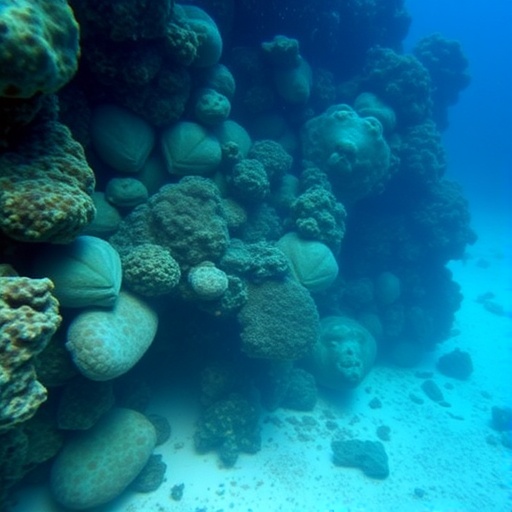In a groundbreaking study published in Coral Reefs, researchers have revealed the intricacies of motile infaunal diversity patterns existing across diverse reef environments in Palau. This research unveils a significant aspect of reef ecology that has long been overlooked, probing into the elusive life forms hidden beneath the reef structures. By dissecting these habitats, the study emphasizes the crucial role that infaunal organisms play in the overall health of reef ecosystems, challenging previous assumptions about biodiversity in these underwater environments.
Palau, an archipelago famed for its stunning marine biodiversity, served as a critical field site for this research. The study highlights how varying reef structures—ranging from heavily degraded to pristine environments—impact the distribution and diversity of motile infauna. Infaunal organisms, which include various species of worms, crustaceans, and mollusks, are essential for nutrient cycling, sediment turnover, and as prey for other marine animals, thereby maintaining ecological balance. The findings of this study underscore the intricate web of life that exists within coral reefs, revealing substantial variations in community composition tied to environmental conditions and the physical attributes of the reef.
The researchers employed a robust methodological approach, using advanced sampling techniques to capture infaunal diversity accurately. By utilizing both quantitative and qualitative methods, they collected and identified various species inhabiting different reef types. The meticulous design ensured that the data gathered would be comprehensive and representative of the infaunal community. Moreover, the use of cutting-edge genetic techniques allowed them to better understand the relationships among different species, shedding light on how these organisms are adapted to their respective environments.
One of the most striking revelations from the study was the variation in motile infaunal communities across different reef types. In pristine reefs, researchers recorded a rich tapestry of species diversity, with a multitude of ecological interactions fostering a healthy ecosystem. Conversely, in areas where reef degradation had occurred, the motile infaunal diversity declined significantly. This decline not only poses a threat to the myriad species that rely on these habitats but also highlights the urgency of conservation efforts aimed at reversing such environmental damage.
The researchers noted a stark correlation between habitat complexity and infaunal community richness. Complex structures provide shelter, breeding grounds, and a diverse array of niches that can support a greater number of species. The study posits that promoting habitat complexity should be a priority in conservation strategies, as it appears to mitigate the impact of environmental stressors on infaunal diversity. This insight offers a pivotal framework for creating more effective management practices that aim to restore and maintain coral reef health.
Another aspect of the study merits attention—the role of environmental stressors such as climate change and pollution. With rising sea temperatures and increased ocean acidification, coral reefs are facing unprecedented challenges. The findings of this research are timely, as they alert policymakers and conservationists to consider how these stressors not only affect coral reefs but also the motile infaunal communities that are integral to reef functioning. The cascading effects of environmental degradation on infaunal diversity can have long-lasting repercussions on overall marine biodiversity and ecosystem stability.
Furthermore, the paper delves into the implications of infaunal diversity patterns for reef resilience. Biodiverse ecosystems are generally more resilient to disturbance, and the varying infaunal communities observed in Palau’s reefs illustrate the potential for resilience strategies. By highlighting the importance of infaunal diversity, the research suggests that efforts to enhance biodiversity could bolster reef resilience, offering a beacon of hope amid the ongoing threats faced by these ecosystems.
In conclusion, the study led by Biondi and colleagues sets a significant precedent for understanding the complex interactions between reef environments and their infaunal inhabitants. By shining a light on this critical yet often unnoticed aspect of reef ecology, researchers advocate for an integrated approach to marine conservation that prioritizes both the protection of coral structures and the diverse life that resides within them. This research can serve as a pivotal reference point for future studies aimed at unraveling the complexities of marine ecosystems, enabling a more profound comprehension of how to preserve these vital habitats for generations to come.
As global attention continues to focus on marine ecosystem preservation, the lessons drawn from this research could very well shape the trajectory of coral reef conservation strategies. Engaging a diverse range of stakeholders—including scientists, conservationists, and local communities—will be paramount in translating these findings into effective conservation actions. This holistic approach can create a synergistic effect, fostering collaboration towards achieving a sustainable future for coral reefs around the globe.
In essence, the findings presented in this study call for a renewed urgency to safeguard not only the visible splendors of coral reefs but also the unseen treasures that dwell beneath. It is a powerful reminder of the interconnectedness of life in marine environments, reinforcing the idea that every organism, no matter how small, plays a vital role in maintaining ecological balance. As we forge ahead into a future marked by environmental challenges, the insights gained from this research may prove invaluable in our collective quest to preserve the delicate tapestry of life within our oceans.
Subject of Research: Motile infaunal diversity patterns in reef environments.
Article Title: Rubble in paradise: motile infaunal diversity patterns across reef environments in Palau.
Article References:
Biondi, P., Kise, H., Masucci, G.D. et al. Rubble in paradise: motile infaunal diversity patterns across reef environments in Palau.
Coral Reefs (2025). https://doi.org/10.1007/s00338-025-02731-9
Image Credits: AI Generated
DOI:
Keywords: Coral reefs, infaunal diversity, Palau, marine ecology, biodiversity, conservation, reef environments, ecological resilience.




